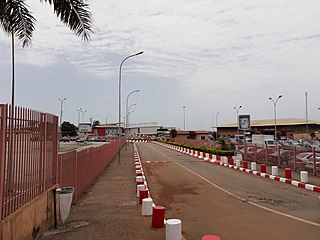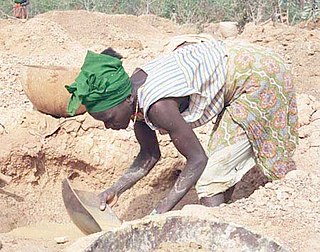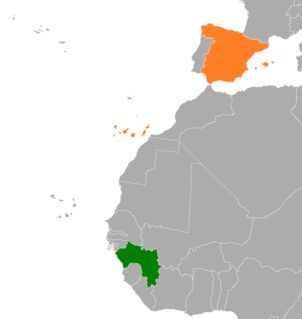
Guinea, officially the Republic of Guinea, Pular: 𞤈𞤫𞤲𞤣𞤢𞥄𞤲𞤣𞤭 𞤘𞤭𞤲𞤫 (Gine), is a coastal country in West Africa. Guinea borders the Atlantic Ocean to the west, Guinea-Bissau to the northwest, Senegal to the north, Mali to the northeast, Cote d'Ivoire to the southeast, and Sierra Leone and Liberia to the south. Formerly known as French Guinea, the modern country is sometimes referred to as Guinea-Conakry after its capital Conakry, to distinguish it from other territories in the eponymous region such as Guinea-Bissau and Equatorial Guinea. Guinea has a population of 12.4 million and an area of 245,857 square kilometres (94,926 sq mi).
The modern state of Guinea did not come into existence until 1958, but the history of the area stretches back well before European colonization. Its current boundaries were determined during the colonial period by the Berlin Conference (1884–1885) and the French, who ruled Guinea until 1958.

Politics of Guinea takes place in a framework of a presidential representative democratic republic, whereby the President of Guinea is both head of state and head of government of Guinea. Executive power is exercised by the government. Legislative power is vested in both the government and the National Assembly.

Conakry is the capital and largest city of Guinea. A port city, it serves as the economic, financial and cultural centre of Guinea. Its population as of the 2014 Guinea census was 1,660,973.

Ahmed Sékou Touré was a Guinean political leader and African statesman who became the first president of Guinea, serving from 1958 until his death in 1984. Touré was among the primary Guinean nationalists involved in gaining independence of the country from France.

Lansana Conté was a Guinean politician and military official who served as the second President of Guinea, from 3 April 1984 until his death on 22 December 2008. Conté came to power in the 1984 Guinean coup d'état.

Kouroussa is a prefecture located in the Kankan Region of Guinea. The capital is Kouroussa. The prefecture covers an area of 14,050 km.² and has a population of 268,630. With Kouroussa town by far the largest in the Prefecture numbering only 10,000, the vast majority of the Prefecture's population live in small rural communities, making their living from subsistence and small scale cash crop agriculture, as well as small scale trade and mining. The majority of the population are members of the Malinke ethnic group or related Mande speakers. The eastern portion of the prefecture is formed from the Niger River valley, while most of the area characterized by low rolling hills and dry savanna grasslands or scrub-like forest.

Kouroussa or Kurussa is a town located in northeastern Guinea, and is the capital of Kouroussa Prefecture. As of 2014 it had a population of 39,611 people. A trade center and river port from at least the time of the Mali Empire, Kouroussa has long relied upon its position near the upstream limit of navigation of the Niger River to make it an important crossroads for people and goods moving between the Guinea coast and the states of the western Soudan and Niger River valley. The town and surrounding area is a center of Malinke culture, and is known for its Djembe drumming tradition.

Ahmed Sékou Touré International Airport, also known as Gbessia International Airport, is an airport serving Conakry, capital of the Republic of Guinea in West Africa. It parallels the south shore of the Kaloum Peninsula approximately five kilometers from its tip. Autoroute Fidel Castro connects the airport to Conakry proper.

The following outline is provided as an overview of and topical guide to Guinea:
Ahmed Tidiane Souaré is a Guinean political figure who was the Prime Minister of Guinea from May 2008 to December 2008, when he was replaced by Kabine Komara following a military coup d'état.

Kabiné Komara was Prime Minister of Guinea from 30 December 2008 to 26 January 2010. Until the end of 2008 a director at the African Export-Import Bank in Cairo, Egypt, Komara was announced as the new Prime Minister in a government radio broadcast on 30 December.
Africa has a large quantity of natural resources, including diamonds, sugar, salt, gold, iron, cobalt, uranium, copper, bauxite, silver, petroleum, and cocoa beans, but also tropical timber and tropical fruit......

Guinea has 1,086 km of railways. This includes 279 km at 1,435 mm gauge and 807 km at 1,000 mm gauge. The latter includes 662 km in common carrier service from Kankan to Conakry.
Bolloré Group operates in Africa since 1927. In 2008, Bolloré Africa Logistics was established to consolidate the Bolloré Group infrastructure and logistic activities across the African continent.

The mining industry of Guinea was developed during colonial rule. The minerals extracted consisted of iron, gold, diamond, and bauxite. Guinea ranks first in the world in bauxite reserves and 6th in the extraction of high-grade bauxite, the aluminium ore. The mining industry and exports of mining products accounted for 17% of Guinea's gross domestic product (GDP) in 2010. Mining accounts for over 50% of its exports. The country accounts for 94% of Africa's mining production of bauxite. The large mineral reserve, which has mostly remained untapped, is of immense interest for international firms.
In 2016, Guinea was ranked 142nd out of 176 countries on the Corruption Perceptions Index published by Transparency International. According to the index Guinea scored a 27 out of 100 for the perceived level of public sector corruption. This is the highest corruption score the country has received since 2006. The lowest score, 16 points, was reached in 2008.

Guinea–Spain relations are the bilateral and diplomatic relations between these two countries. Guinea has an embassy in Madrid and honorary consulate in Barcelona, Las Palmas de Gran Canaria and Valencia. Spain has an embassy in Conakry.














